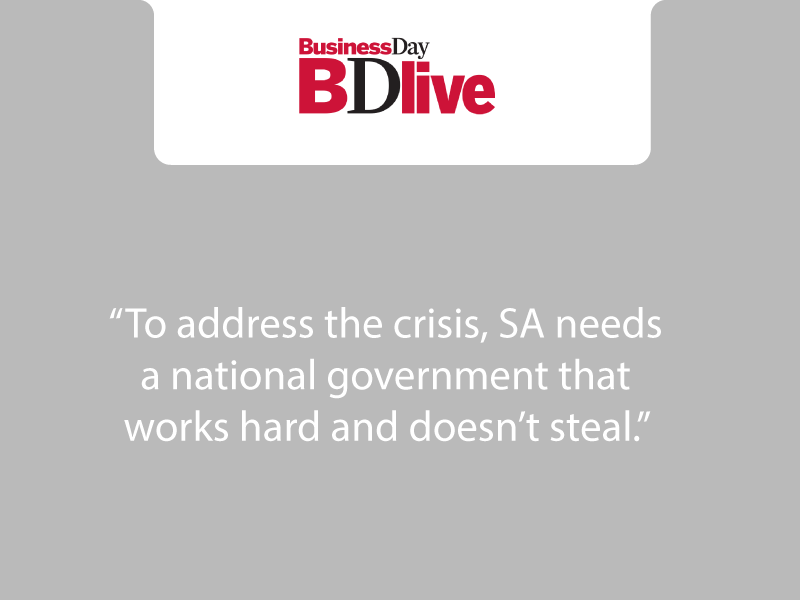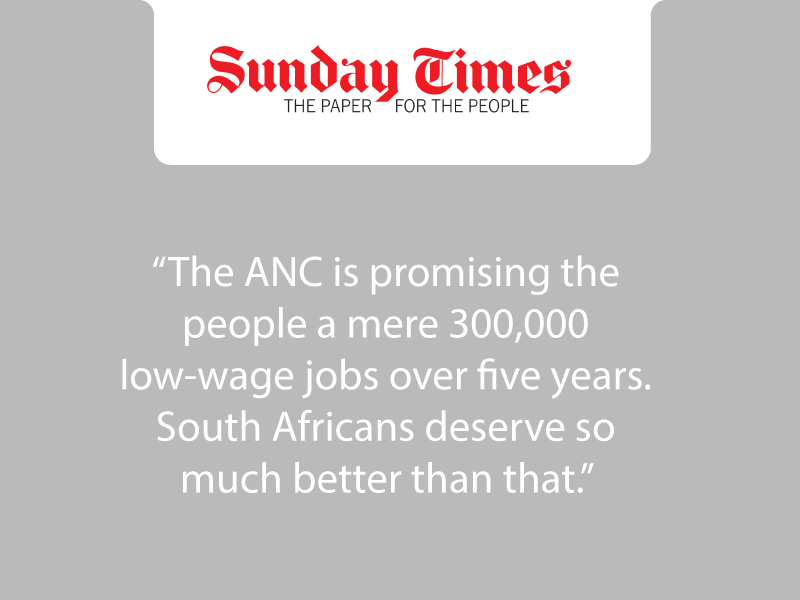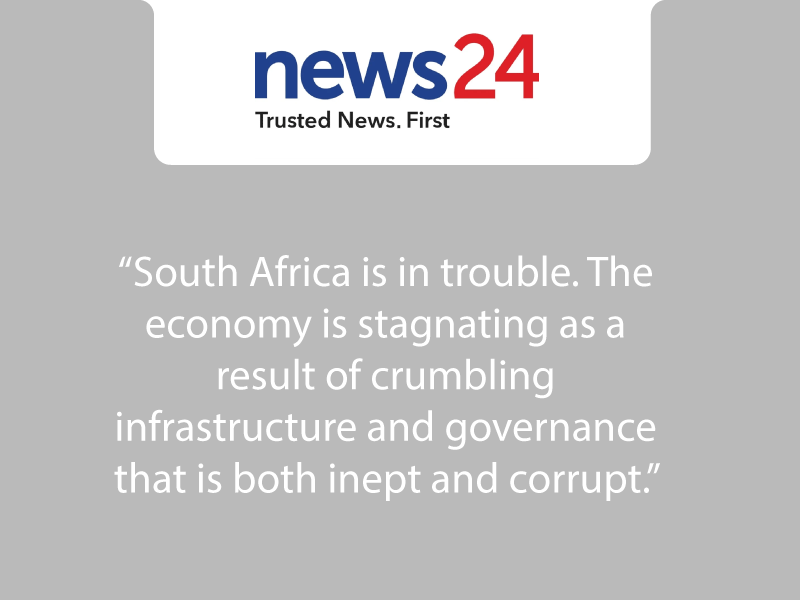 While capacity to redistribute is at full stretch, policies make it more difficult for excluded people to find work.
While capacity to redistribute is at full stretch, policies make it more difficult for excluded people to find work.
A generation after the end of apartheid, SA remains a country characterised by mass social and economic exclusion, a country in which only a minority of people can be said to be effectively included.
With economic and employment growth hovering around zero, and with risks accumulating on the government’s balance sheet, SA is going backwards. More of the same will only deepen levels of exclusion. How, then, should we think about inclusion?
Too often, when politicians and policy makers talk about inclusion, their ideas seem to be built on the assumption that the process of inclusion happens after the production of goods and services has been completed. For them, inclusive policies are those that redistribute value created during productive activities from those involved in those activities to those who were not. Redistribution is, from this perspective, the heart of inclusion.
Another way of thinking about inclusion is to see it as intrinsic to the productive process. It is the process of expanding the quantity, range and value of economic activities that drives the inclusion of people, because this is the outcome of expanding employment to millions more people and raising their incomes.
This approach has been successful in reducing poverty in the developing world’s most successful economies, where rapid economic growth, driven by industrialisation, has led hundreds of millions of people to move from low-productivity, low-income agricultural work to higher-productivity, better-paying manufacturing and service sector jobs.
While every society should provide for people through state-directed redistributive activities, engaging the unemployed in new productive activities has several advantages. The critical one is that getting people into work increases national income, in principle making everyone better off because society is richer and fewer people rely on fiscal transfers.
Employment is far more empowering than grants. Jobs can lead to rapid skill acquisition. Leading Harvard professor Ricardo Hausmann argues that SA compensates people for their exclusion; we should rather focus on more effective forms of inclusion.
One mistake is to focus too much attention on redistribution of the fruits of productive activities. A second is for policy makers to spend too much energy on those who already have jobs — in particular, on raising their incomes — rather than on finding ways to include people who are totally excluded.
Unfortunately, many of the strategies that improve the prospects of the employed have the unintended effect of reducing the likelihood of those without work ever finding any.
Increasing employment is always a desirable way of expanding inclusion. Most people would agree that employment is far superior to more inclusion through redistribution. This approach is also much more likely to be successful. Consider the enormous strides made in countries in East Asia — starting with Japan in the ’50s and followed by Hong Kong, Taiwan, South Korea, China and Vietnam.
In these countries the primary driving force of prosperity and inclusion has been the considerable growth of employment in the formal, nonagricultural sectors. Hundreds of millions of jobs have been created and drastic changes in poverty achieved.
Unfortunately, despite the stated commitment to more rapid economic and employment growth, SA’s progress has been very poor. There are many reasons for this, and some are beyond the control of policy makers.
However, many of the other reasons involve SA’s policy choices; and these are the most important factors why there has not been faster employment-driven inclusion. Many policies, conceived as an attempt to improve working conditions of the employed, have had the effect of making it more difficult for those who are excluded to find work. So how should we think about inclusion?
We need to recognise that, however desirable it might be to improve the conditions and security of those who have jobs, the national priority has to be finding ways to broaden inclusion to the unemployed.
We need also to acknowledge that we are at, or beyond, the limits of the economy’s capacity to redistribute income efficiently and that attempts to push us much beyond where we are could drive us into fiscal crisis.
SA’s subinvestment grade rating on sovereign debt means that the world’s investors think this is a real possibility. We should therefore be especially wary of high-risk proposals aimed at redistributing assets and incomes in ways that are bound to choke off growth even more. Proposals in this category include making drastic changes to property rights, in land (there are calls for expropriation without compensation) or companies (some are advocating wholesale nationalisation of large parts of the private economy)
These kinds of initiatives might improve the lot of a tiny number of beneficiaries, but there is absolutely no reason to expect them to have anything but the most disastrous effects on economic and employment growth. Proponents might think that outcomes cannot be worse than what is being experienced now, but that is far from true. Very bad things can happen to economies run by poorly informed policy makers. Even if they are well-intentioned. And too many of SA’s policy makers are not well-intentioned.
Instead of focusing on high-risk policy changes, the government and opposition parties should be looking closely at the kinds of reforms needed if millions of new jobs are to come on line in the next decade.
A large majority of those who are unemployed have very little education — 60% have less than a matric — so SA needs to create jobs for the workforce it actually has. Millions of new jobs are needed for those with few skills and little or no work experience. Our labour market policies result in a system where the creation of these jobs is very unattractive.
Creating an environment in which companies are able (and encouraged) to create large numbers of low-skill jobs is the single most important step SA could take to make its growth path more inclusive. This can be done. Millions of low-skill jobs are leaving China, automation is not yet taking place in these sectors, and with the right policies, SA could be competitive in these industries.
Too many of SA’s industrial sectors are marked by high levels of concentration, with a small number of dominant companies. Much of this is not the result of abusive and anticompetitive practices but of policies that lower the cost of capital in relation to the cost of labour, combined (in retailing) with urban structures that make it very hard for small businesses to find niches.
Given the top-heavy character of our business sector, we need to focus on assisting smaller companies. We need a better understanding of the regulations and practices that prevent small businesses from being formed and prospering. In particular, we should be looking at exempting smaller businesses from onerous regulations, although we need to prevent such exemptions from reducing companies’ incentives to grow.
In the cities, apartheid’s spatial legacies cut many small companies off from markets: businesses that can only service relatively poor customers face constraints. The goal should be to tackle spatial legacies and to provide support to companies seeking new markets.
A focus on production-driven inclusion does not imply that SA should not use its state, tax and social security systems to redistribute income. The country’s relative prosperity means that, unlike very poor developing countries, we can afford to ameliorate the effects of a low-skill, low-wage growth path using our already relatively large social security system, along with the provision of a range of free or near-free public services.
We should, however, insist that the efficacy of redistributive programmes is improved: providing free education to the poor is of limited benefit if the education is all but worthless. Affordable, safe and efficient public transport must become a much higher priority.
Embracing a growth path of this kind — the rapid expansion of employment in low-productivity sectors combined with smart and decent social security programmes — is at the heart of what a programme of inclusive growth should look like. It is entirely achievable.
- Ann Bernstein is executive director of the Centre for Development and Enterprise.




